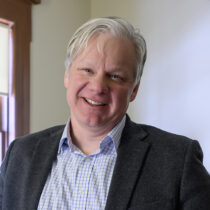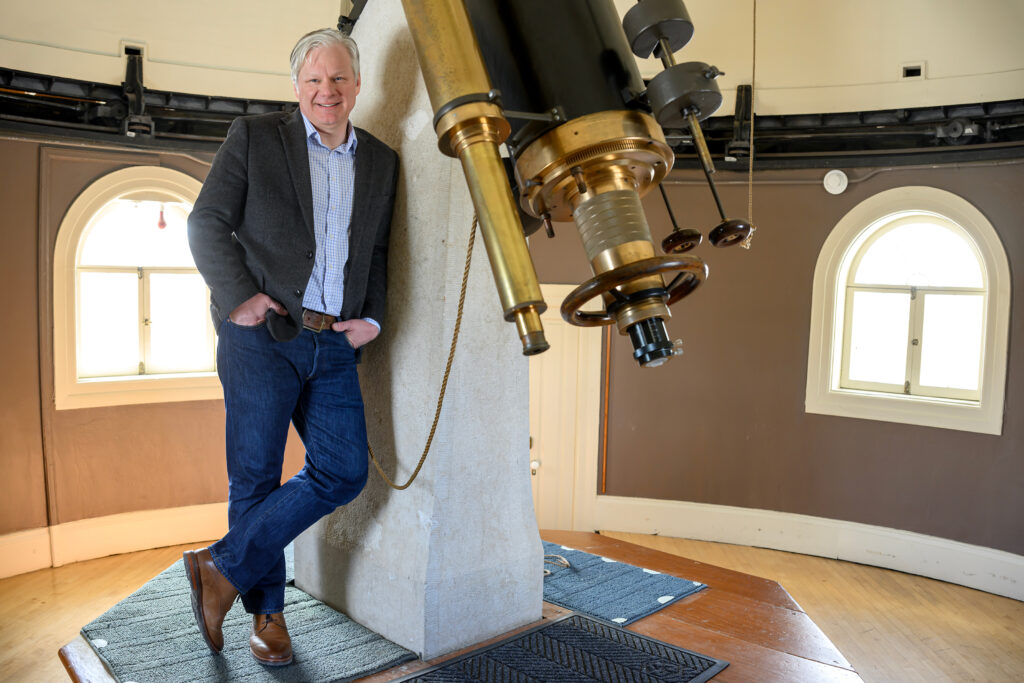News Stories

A Historic Facility, a New Director
Meet Gregory Parker, the new director of the Judy and Stanley Frankel Detroit Observatory
By Kim Clarke
It would seem the stars have aligned for Gregory Parker.
For the past 20 years, the Brighton, Michigan, native has worked for organizations that share history with the public in engaging, insightful ways, connecting the past with today’s issues and challenges. His passion for public history now comes to the fore in his new role as director of the Judy and Stanley Frankel Detroit Observatory.
The Detroit Observatory is the oldest academic facility at the University of Michigan and is a division of the Bentley Historical Library. Built in 1854, it was a bricks-and-mortar expression of President Henry P. Tappan’s commitment to grounding U-M’s academic mission in scientific inquiry.
“It’s the singular symbol of U-M’s emergence as a research institution,” Parker says.
With an office at the observatory, Parker marvels that he walks the same wooden floors traversed by earlier directors, including such scientific luminaries as Franz Brünnow and James C. Watson.
Parker joined the Bentley earlier this year after 13 years with U-M’s History Department, where he was manager of public engagement and the Eisenberg Institute for Historical Studies. That included coordinating more than 50 events annually, from conferences and lectures to student commencement. He developed a podcast showcasing the work of faculty and graduate students, and advised undergraduate history students as they researched archival materials for “Michigan in the World” digital exhibits.

Gregory Parker at the Judy and Stanley Frankel Detroit Observatory. Photos by Lon Horwedel.
He also developed and taught an undergraduate course about the practice of public history, including theory and methods. It allowed students to understand the potential uses of a history degree. “It’s very rewarding to see students excited about career paths,” he says.
Parker holds a U-M bachelor’s degree in economics and social movements, and a master’s in history from Columbia University.
He previously was a program officer with Michigan Humanities, where he built the Great Michigan Read, a statewide program exploring Michigan literature. “I didn’t know it at the time, but I was doing public humanities and public history,” he says. The program continues today.
The Detroit Observatory is both a museum and a locus for public events, such as panel discussions about U-M’s past, historical walking tours of the campus, exhibits, and nightly observations of the skies. It pulls together the history of science, astronomy, the university and the state.
“I’m excited about connecting U-M history to the larger world,” Parker says.
He sees his new role as a career pinnacle, allowing him to build on his experience and reach even more audiences interested in U-M history. That includes “the good and bad, warts and all.”
A critical feature of the Detroit Observatory is the work of 15 student docents. Some are studying astronomy, and others are pursuing history. All contribute to the observatory’s programs with their research and knowledge.
Parker is looking to elevate the profile of the Detroit Observatory and all that it offers, including more hands-on learning opportunities for students and an expansion of exhibits and displays. “I want us to be a go-to place for the university’s history.”
